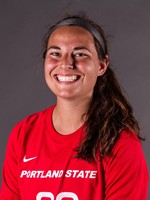Abbie Faingold, Granddaughter of a Holocaust Survivor, Reflects on Playing in European Maccabi Games in Berlin
Posted On September 17, 2015 by PUSC
by John Wykoff
Polish Jew Leon Faingold was a Holocaust survivor. The native of Poland was among the few to survive the infamous Auschwitz network of concentration camps where at least 1.1 million people were killed by the Nazis during World War II. 90 percent of them were Jewish.
So, redshirt freshman goalkeeper Abbie Faingold‘s recent trip to Berlin to participate in the 2015 European Maccabi Games, had a special meaning. The Maccabi Games bring together Jewish athletes from Europe, the U.S. and Mexico for a wide range of sporting contests, from soccer to horseback riding to chess.
As you’ve probably guessed, Leon Faingold was Abbie Faingold‘s paternal grandfather, who immigrated to the United States after the war.
The 2015 European Maccabi Games soccer matches were held in the 110,000-seat Olympic Stadium, the largest stadium in the world when built by Adolph Hitler to showcase the new Nazi Germany during the 1936 Olympics held in Berlin.
And the Nazis didn’t allow German Jews to participate on their Olympic team even though several were among top world contenders.
“We played in the Olympic Stadium built by Hitler. Having 2,000 Jewish athletes in the stadium Hitler built shows how we’ve grown in 80 years, how tough we are, that we’re not going away,” said Faingold.
She found the experience somber at first, thinking about the discrimination, she said. “However, being there with 2,000 Jewish athletes was very eye opening and made me excited for the games to begin. It gave me chills thinking that here we all are, walking into a stadium which we would’ve been forbidden to be in 80 years ago,” she said.
“Not only did I want to compete for myself and country, but I also wanted to dedicate my wins to my grandfather who had to endure Auschwitz through the duration of the war and was denied his childhood,” Faingold added.
There also were tours of Berlin, which included buildings damaged during the war but still standing…”and there’s still a big difference between East and West Berlin” with West Berlin appearing much more prosperous, she said.
For all that, Faingold’s biggest takeaway from this experience was the friendships she developed. Most of the American women soccer players selected for these Maccabi Games play on Division I or Division II soccer teams. In fact, she’s played against a couple of them in pre-season matches this year.
“We got to know each other and have become close friends. We’ve stayed in touch since we got back and our goal is to play in the Israel Maccabi games in two years (there are European, Pan American and Israeli Maccabi Games). We’ll see. The selection is a little stricter for that one, but that’s our goal,” said Faingold.
In terms of soccer, she said the matches weren’t terribly competitive because it was the American team, with a much larger pool from which to choose, against national teams from Sweden, the Netherlands and Germany.
Still, she thought it helped her soccer.
“We had different coaches so we got comments on our playing from different points of view. I had to learn to be more comfortable in a new environment and be more vocal, more of a leader, in telling girls what I needed from them. You learn to adjust quickly and seeing how other countries play is useful.”
Overall, said Faingold, “I think everyone felt proud to be walking into the Olympic Park and thinking, ‘we are still here’. We all wanted to do our best and bring home a gold for America (which they did with a 2-0 win over Sweden).
And, regardless of whether or not Faingold gets into more Maccabi Games, she’s confident she won’t soon forget these games. “It was an experience that will be with me the rest of my life.”
Get Updates
[constantcontactapi formid="1"]- Placer United Soccer Skills Camp Series
- Munchkin Madness

